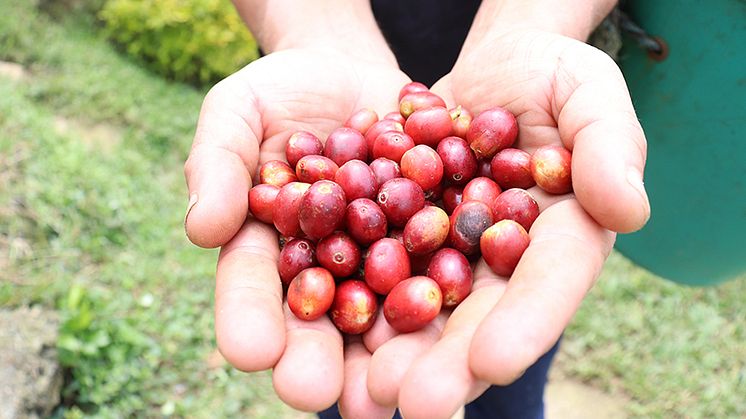
Blog post -
Is blockchain our missing link for a fairer, greener coffee trade?
While worldwide coffee consumption is growing, the inequalities in the supply chain are becoming even more significant. Smallholder farmers, who do most of the work, earn the least money, while large companies capture most the profit. The economic imbalances seem to have a self-reinforcing effect – farmers’ share of the total value of the global coffee market decreased from 20% in 1989 to less than 10% in 2015. This coffee paradox is well-known, but we still haven’t seen the solutions for a real change.
With the increasing growth in demand, coffee production will pose tremendous pressure on water resources and forest landscapes. Triple changes of population growth, increasing global affluence, and changing consumption patterns will increase greenhouse gas (GHG) emissions and negative environmental impacts related to coffee growing and food production in general. The pressure on existing eco-systems will rise and the need for change is obvious.

Value chains are complex, involving a multitude of actors and processes. Along the way, information on the origin of the product and on how it was produced and processed is lost. To minimize the social and environmental impacts of land-based products such as coffee, access to information on the product is necessary to obtain the required behaviour change. As consumers, we need access to trustworthy data to be able to make informed choices about the products we buy. Transparency becomes everything. When applied right, blockchain technology has exactly this unique capability to provide traceability, transparency and accountability in supply chains.
Using block chain in food value chains
Is blockchain technology the game changer we have been searching for? To be honest, we do not know yet. There is a lot of hype around the technology these days, also within the coffee sector. Most recently, at the big tech trade show CES 2020 in Las Vegas, IBM together with a number of American and international companies like JDE, Beyers Koffie, Volcafe, Sucafina, Rabobank and others launched the “Thank my Farmer” app. The aim of the app being to bring the tracking capabilities of blockchain to coffee sourcing.
Food value chains are complex systems of activities with several stakeholders and introducing blockchain technology is a challenging task. A few food industry projects are already running, but they all have main challenges to consider. The complexity goes for coffee too. From the plant to the cup, coffee transforms from cherry to parchment to bean to beverage and travels long distances, involving farmers, cooperatives, middlemen, exporters, warehouses, transport companies, roasters, retailers and final consumers.

Source: The Sustainability Consortium
The primary focus of current blockchain projects in the food industry is on transparency and traceability, as these are currently considered the main qualities of blockchain-based systems. In coffee, an additional focus is on social sustainability and ethical payment to the farmer, and experiences has shown successful results in securing a higher rate for the farmer, as well as facilitating financial support of sustainability projects from the consumers. Although this is a promising start, the systems are not yet mature.
The blockchain technology has both advantages and limitations. Advantages include streamlining of data, building connectivity and trust between actors, improved traceability and more. But a main challenge is still that the blockchain cannot track the physical product, only the data input, and at this point, the blockchain system cannot entirely eliminate the risk of fraud and errors.
Blockchain in Coffee – we want to know more
As a partnership between private companies, advisory firms, universities and NGO’s, our project investigates the potential use of blockchain technology to accelerate sustainability, transparency and traceability in the coffee value chain. We share the vision that blockchain technology can revolutionize sustainability reporting and transparency in global supply chains, but we wish to find out how.

To establish trustworthy blockchains, we must truly understand existing supply chain structures. In this matter, we are carrying out case studies of coffee value chains in Colombia and Ethiopia. Together with our partners, including FNC, the Columbian Federation of Coffee Growers, we are analyzing the flow of the coffee beans from the coffee growers in Antioquia, Colombia through the various processes until they leave the port of Cartagena and continues the journey to consumers in Europe. This includes several intermediaries including farmers, cooperatives, export sellers, warehouses and port facilities, international coffee traders and transporters, certification auditors, importers, roasters, and retailers such as grocery stores, cafes and specialty shops.
As a final result, we expect to have not only a blockchain sourced coffee, but also a scientific analysis of pros and cons connected to the use of blockchain technology.
The project team is organized around the global advisory firm, COWI A/S, and project partners include: Department of Computer Science, and Department of Geoscience and Natural Resource Management at Copenhagen University, European Blockchain Center at IT University of Copenhagen and Chalmers University of Technology, WWF, Nordic Approach and Löfbergs/Peter Larsen Kaffe.
